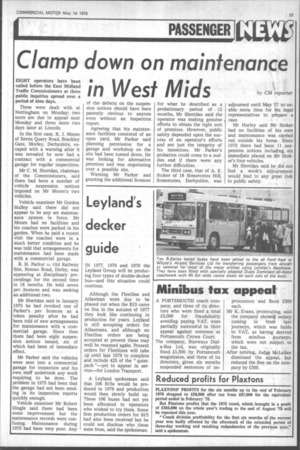Clamp down on maintenance
Page 53

If you've noticed an error in this article please click here to report it so we can fix it.
in West Mids by CM reporter EIGHT operators have been called before the East Midland Traffic Commissioners at three public inquiries spread over a period of nine days.
Three were dealt with at Nottingham on Monday; two more are due to appear next Monday and three more two days later at Lincoln.
In the first case, K. J. Moore of Seven Quary Road, Brackley Gate, Morley, Derbyshire, escaped with a warning after it was revealed he now had a contract with a commercial garage for regular inspections.
Mr C. M. Sheridan, chairman of the Commissioners, said there had been a number of vehicle suspension notices imposed on Mr Moore's two vehicles.
Vehicle examiner Mr Gordon Hulley said there did not appear to be any set maintenance system in force. Mr Moore had no facilities and his coaches were parked in his garden. When he paid a recent visit the coaches were in a much better condition and he was told that arrangements for maintenance had been made with a commercial garage.
R. H. Parker ot Old Railway Site, Roman Road, Derby, was appearing at disciplinary proceedings for the second time in 18 months. He held seven psv licences and was seeking an additional two.
Mr Sheridan said in January 1975 he had revoked one of Parker's psv licences as a token penalty after he had been told of new arrangements _for maintenance with a commercial garage. Since then there had been eight suspension notices issued, six of which had been of immediate effect.
Mr Parker said the vehicles were sent into a commercial garage for inspection and his own staff undertook any work requiring to be done. The problem in 1975 had been that the garage had not been sending in its inspection reports quickly enough.
Vehicle examiner Mr Robert Dingle said there had been some improvement but the maintenance records were confusing. Maintenance during 1975 had been very poor. Any of the defects on the suspension notices should have been patently obvious to anyone even without an inspection report.
Agreeing that his maintenance facilities consisted of an open yard, Mr Parker said planning permission for a garage and workshop on the site had been turned down. He was looking for alternative premises and was negotiating over a possible site.
Warning Mr Parker and granting the additional licences for what he described as a probationary period of 12 months, Mr Sheridan said the operator was making genuine efforts to obtain the right sort of premises. However, public safety depended upon the success of an operator's efforts and not just the integrity of his intentions. Mr Parker's probation could come to a sudden end if there were any further difficulties.
The third case, that of A. E. Stoker of 16 Somercotes Hill, Somercotes, Derbyshire, was adjourned until May 17 to enable more time for his legal representatives to prepare a case.
Mr Hurley said Mr Stoker had no facilities of his own and maintenance was carried out outside his home. Since 1973 there had been 11 suspension notices including six immediate placed on Mr Stoker's four vehicles.
Mr Sheridan said he did not feel a week's adjournment would lead to any great risk to public safety.




























































































































































































































